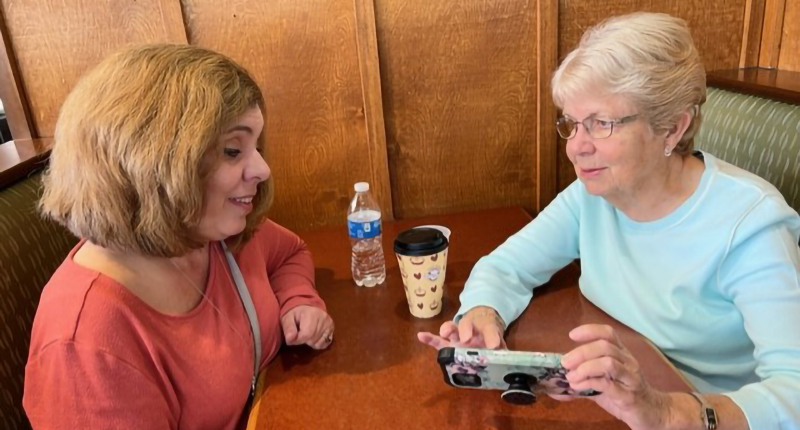Medicare Expansion Benefits Seniors with Hearing Loss

Q&A with Donna L. Sorkin and Ann Liming: Cochlear Implant Recipient
In September 2022, Medicare expanded its cochlear implant (CI) candidacy criteria to allow more seniors with hearing loss to benefit from the life-changing solution thanks in part to research led by the American Cochlear Implant Alliance (ACIA). ACIA Executive Director Donna L. Sorkin and her team were instrumental in securing the policy change through a study they conducted in partnership with the Centers for Medicare and Medicaid Services (CMS).
Donna will walk us through what the Medicare change means for beneficiaries with hearing loss, what the study entailed, and the benefits of cochlear implant technology.
We’ll also hear from study participant Ann Liming, an 81-year-old who struggled with progressive hearing loss for years. Ann was previously unable to qualify for a cochlear implant (CI) under Medicare until she heard about the ACIA study and now has a CI of her own. She’ll share how her life has improved since receiving her implant.
What does this news mean?
Donna L. Sorkin: With Medicare expanding its cochlear implant candidacy criteria — thanks in part to the CMS approved study we led at the ACIA — it means more seniors with hearing loss will be able to benefit from life-changing hearing devices. Aging adults with moderate to profound hearing loss who have been previously evaluated and told they did not qualify for an implant may wish to go back to a CI center for reevaluation, as they may now be eligible under the new policy. And for those who struggle with hearing loss who are no longer benefiting sufficiently from hearing aids, now is a great time to consider exploring this option for improved hearing and clarity!
This policy change in criteria was effective on Sept. 26, 2022. It’s notable because it significantly improves access to CI care for older adults who are Medicare beneficiaries. Most U.S. residents aged 65 and older rely on Medicare for healthcare benefits. With these criteria broadened, it brings those folks closer to the CI insurance criteria used by most employers and other insurance plans.
What is the new policy change, and who does it apply to?
Donna: The policy change updated the candidacy criteria to better align with FDA guidelines and private insurance plans. Now, older adults are eligible for CIs with best-aided hearing test scores of 60%. Previously, adults receiving a CI under Medicare were limited to sentence test scores in the best-aided condition (usually with hearing aids in both ears) of 40%. This new policy is good news for a third of people 65 and over with hearing loss, some of whom may no longer benefit from hearing aids based on their degree of hearing loss. Hearing aids make sounds louder, whereas cochlear implants deliver speech and sound clarity.
To potentially be eligible for a cochlear implant under the new policy, patients must be 65 or older, rely on Medicare for health care benefits, and meet all the following criteria:
- Diagnosis of bilateral moderate to profound sensorineural hearing impairment with limited benefit from appropriate hearing (or vibrotactile) aids.
- Cognitive ability to use auditory clues and a willingness to undergo an extended program of rehabilitation.
- Freedom from a middle ear infection, an accessible cochlear lumen that is structurally suited to implantation, and freedom from lesions in the auditory nerve and acoustic areas of the central nervous system.
- No contraindications to surgery.
- The device must be used by following FDA-approved labeling.
In some cases, CMS may also provide coverage of cochlear implants for beneficiaries not meeting all the criteria. A visit to a cochlear implant center will help determine if you’re a candidate for a CI under the new standards. You can find a listing by state here.
What was the process like for CED study participants?
Donna: Ten cochlear implant clinics around the country recruited patients and collected data on hearing outcomes before and after a cochlear implant. Study participants experienced median improvements of up to 53%. This was life-changing for patients, dramatically improving their quality of life. One man said he could now take his granddaughter out to breakfast and comfortably converse, something he’d been unable to do before.
How can a cochlear implant change lives for the better?
Donna: Hearing aids are typically the first step to treating hearing loss and can be effective for someone who only needs sounds to be made louder to hear. As hearing loss progresses, sounds need to be improved by becoming louder and clearer so speech can be better understood. Cochlear implants can help aging adults have successful phone conversations, keep up with people in conversations, hear better in noisy environments or the presence of background noise, and once again enjoy natural sounds like rain falling and birds chirping.
Are there risks to untreated hearing loss?
Donna: Hearing loss is connected to increased social isolation and loneliness, balance issues, and fall risk if left untreated. Emerging evidence associates untreated hearing loss with diminished brain health and mental sharpness. Addressing and appropriately treating hearing loss is vital for healthy aging.
Specifically, within our study, we found participants 12 months post-CI experienced a statistically significant improvement in not only speech perception but also in other quality of life metrics, like being able to converse in small groups of friends, talking on the telephone, music enjoyment, and chatting with grandchildren.
How can a patient previously evaluated and told they didn’t qualify for the cochlear implant get a new evaluation?
Donna: Many CI clinics are nationwide; click here for a listing near you.
What’s next?
Donna: Today, we’re focused on increasing awareness of this recent Medicare expansion to help more people hear. We’re also building partnerships to advance understanding of cochlear implantation. We are grateful for the response from hearing health professionals who work in various settings, including those who do not provide cochlear implant care but want to ensure people have the right technology at the right time.

Now let’s hear from Ann Liming, 81 years young, from Grand Rapids, Mich., as she shares her experience with her cochlear implants and how it has changed her life.
Would you mind confirming your hearing loss diagnosis?
Ann Liming: Progressive hearing loss.
How did you discover cochlear implants, and did anyone in your life inspire you to get one?
Ann: I learned about cochlear implantation from my older sister, who was diagnosed with hearing loss while still in high school.
Can you describe how you became a part of the CED study?
Ann: I have been an active Hearing Loss Association of America (HLAA) member, participating in the HLAA Lansing Chapter in Michigan and attending national and state HLAA Conventions for a long time now. I witnessed firsthand CI’s life-changing benefits for people I knew at the various HLAA meetings and conventions I’ve attended.
When I received my initial evaluation for a CI, I didn’t qualify because I had too much hearing under Medicare criteria. And yet, under a typical private-employer insurance plan, I would have been authorized for a cochlear implant. After visiting a friend who experienced a similar disappointment, I returned to the CI clinic for reevaluation. I still didn’t qualify under the Medicare rules, but I learned of the Medicare coverage expansion study and was invited to participate!
What was it like participating in the study?
Ann: CMS covered my evaluation, device, surgery, and follow-up care, just as it would for any eligible Medicare beneficiary. I followed my clinic’s guidance on rehab protocol and listening practice to best adapt to my CI hearing with apps and audiobooks.
What is your life like now after receiving your CI?
Ann: I currently hear with a CI on one side and a hearing aid on the other ear, but I am now considering a second CI!
I am far more confident now, have a greater feeling of independence, and don’t shy away from the small group gatherings I participate in. I feel people are more at ease communicating with me and that my input is valued. I used to think people talked around me or treated me like I wasn’t there because they did not know how to deal with my hearing loss. I can comfortably and confidently make phone calls to businesses and medical practices without the fear of struggling and possibly misunderstanding information.
I find it much easier to ask for communication assistance. Masks muffle voices, and I can easily ask people to lower their masks when talking to me. I hear much better in large groups with no listening system and don’t feel I am a burden when I ask someone to repeat a portion of what was said. I don’t dread going places and doing things with family and friends. Perhaps I would say I am happier, more active, and feel younger mentally.
If you could share one piece of advice with the hearing loss community, what would it be?
Ann: If someone needs a CI and qualifies for one, you mustn’t put it off. I’m grateful to share my story, and I feel like my CI has been a gift to me.






